Store your ssh keys in keepassxc
In this post I will show you how to use KeePassXC to store your ssh credentials.
Configure ssh agent:
# add to ~/.zshrc or ~/.bashrc
cat <<EOF >> ~/.zshrc
if ! pgrep -u "$USER" ssh-agent > /dev/null;
then
ssh-agent > "$XDG_RUNTIME_DIR/ssh-agent.env"
fi
if [[ ! "$SSH_AUTH_SOCK" ]];
then
eval "$(<"$XDG_RUNTIME_DIR/ssh-agent.env")"
fi
EOF
mkdir -p ~/.config/systemd/user/
cat <<EOF > ~/.config/systemd/user/ssh-agent.service
[Unit]
Description=SSH key agent
[Service]
Type=simple
Environment=SSH_AUTH_SOCK=%t/ssh-agent.socket
# DISPLAY required for ssh-askpass to work
Environment=DISPLAY=:0
ExecStart=/usr/bin/ssh-agent -D -a $SSH_AUTH_SOCK
[Install]
WantedBy=default.target
EOF
echo SSH_AUTH_SOCK DEFAULT="${XDG_RUNTIME_DIR}/ssh-agent.socket" >> ~/.pam_environment
Remember that you’ll need to re login for the .pam_environment changes to take effect.
Configuring KeepassXC for SSH Agent Integration
- Ppen KeepassXC and go to Tools > Settings. In the settings window click on SSH Agent, and then tick the checkbox that says Enable SSH Agent.

Now we need to add the ssh key to keepassxc:

If you have a password protected key add the password to keepassxc without a username.

And the last thing you need to do is to set up the key to be available to the SSH Agent. For that just click the SSH Agent icon:

Starting SSH Agent with systemd
echo '[Unit]
Description=SSH key agent
[Service]
Type=simple
Environment=SSH_AUTH_SOCK=%t/ssh-agent.socket
# DISPLAY required for ssh-askpass to work
Environment=DISPLAY=:0
ExecStart=/usr/bin/ssh-agent -D -a $SSH_AUTH_SOCK
[Install]
WantedBy=default.target
' > ~/.config/systemd/user/ssh-agent.service
Now you can start and stop the SSH Agent using:
systemctl start --user ssh-agent
systemctl enable --user ssh-agent
Lock and unlock your database to see that the key is now available in your agent:
ssh-add -l
256 SHA256:pPcl+pI2TTkzIL6psB/13wwxQLOA9jZp1+A/E+sHI3Q bastion production (ED25519)
For OSX you need to start a separete ssh-agent process:
eval $(ssh-agent)
open -a KeePassXC.app /dev/null --args --allow-screencapture
